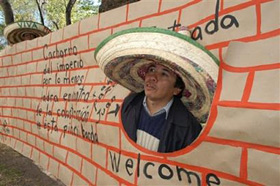 |
 |
 |
 News from Around the Americas | January 2006 News from Around the Americas | January 2006  
Few Expatriate Mexicans Seek Absentee Ballots for Elections
 Peter Prengaman - Associated Press Peter Prengaman - Associated Press


| | A man wearing a large sombrero looks out from a paper wall set up outside of the U.S. Embassy in Mexico during a protest in Mexico City. The protest was held against the proposed U.S. House of Representatives bill that would make illegal immigration a felony and proposes extending border walls. (AP) |
Lynwood – Luis del Angel Garcia perks up as the first person in an hour approaches his information booth to ask about voting in the 2006 Mexican presidential election. But like millions of other Mexican citizens living in the United States, the man has no voter card and can't return to Mexico to get one because he's in this country illegally. Without the card, he can't apply for an absentee ballot.

That dynamic is threatening to scuttle the first-ever attempt by Mexico to let expatriates vote.

With two weeks left before the Jan. 15 deadline to apply for absentee ballots, just over 8,000 Mexicans in the United States – about two-tenths of 1 percent of those eligible – have filed the necessary paperwork.

"People want to vote, but the Mexican government has put up obstacles that make it almost impossible," said Garcia, who runs a volunteer booth at a plaza in this heavily Hispanic Los Angeles suburb.

The approximately 11 million Mexicans in this country include more than 4 million eligible voters, according to the Mexican government. They represent a potentially huge bloc that could sway the July 2 vote – the first since Vicente Fox won the presidency in 2000, breaking the Institutional Revolutionary Party's 71-year hold on power.

Mexican law prevents Fox from seeking another term. Former Mexico City Mayor Andres Manuel Lopez Obrador had been the race's front-runner, though recent polls show the race narrowing to a near-tie with candidates from Fox's conservative National Action Party and the Institutional Revolutionary Party.

The expatriate voting law passed in June was widely interpreted as recognition of the billions of dollars pumped into the national economy when expatriates send money home to relatives.

Mexican officials insist tough regulations are necessary to ensure a clean election. They want greater participation by expatriates, "but in the end it's up to them to make that decision," said Ruben Aguilar, a spokesman for Fox.

Political analysts and advocacy groups blame the government for the low number of absentee applications, saying the process is difficult at best – and not just for Mexicans in the United States illegally.

To get an absentee ballot, expatriates must send copies of their voting card, Mexican identification and proof of U.S. residency to Mexico's Federal Electoral Institute. Those without the card must travel to Mexico to apply for one then return a few weeks later to pick it up.

"Just as motorists can be fined for bad driving, the Mexican Congress should be fined for reckless legislating," said George Grayson, a government professor and Mexico expert at The College of William & Mary in Williamsburg, Va.

Expatriates also complain that it's hard to connect with candidates because election officials have prohibited campaigning in the United States to help ensure compliance with Mexico's political spending limits.

The U.S. effort is being run by the election institute, which has no plans to issue voter cards here.

"The reality is we don't have the tools" to solve those problems, said Patricio Ballados, the institute's expatriate vote coordinator.

To promote the election, 3.5 million absentee applications have been shipped to Mexican consulates and organizations across the United States. Ads urging people to vote are running in Spanish-language newspapers and on Spanish-language television.

In addition, election workers have been sent to border cities to give absentee applications to Mexicans returning for the holidays.

Those measures won't help expatriates such as Mauro Martinez, 55, who entered the United States illegally 10 years ago.

"I can't leave because my residency papers are not in order," he told Garcia at the voter information booth in Lynwood.

Garcia sighed and took Martinez's phone number, promising to call if officials grant requests to set up registration booths in the United States. Meanwhile, Mexican advocacy groups are busing expatriates to Mexican border cities to apply for voter cards.

"After so much pressure to get the right to vote, if only a few vote the government will say, 'Look, they are not interested,'" said Eduardo Ruiz, president of the Los Angeles-based Federation de Aguas Calientes, which organizes weekly trips to Tijuana.

Expatriates said the voting requirements are discouraging even the most determined voters. Besides the trips to Mexico, it can be difficult to find utility bills or other documents proving they once lived in Mexico.

"It's absurd," said Francisco Mendoza, a Mexico native who has lived in California for 16 years and publishes a small Spanish-language newspaper in Lynwood. Mendoza wants to vote but no longer has the necessary documents.

At the voter information booth, Garcia said the low application numbers were heartbreaking, regardless of the reasons. He immigrated 10 years ago and now sells toys while sending $150 every two weeks to his brothers in Mexico.

"Many of us came here because there were not jobs in Mexico," Garcia said. "But how are we going to change Mexico if we don't vote?"

On the Net: www.mxvote06.org | 
 | |
 |



